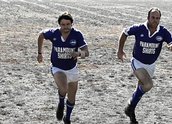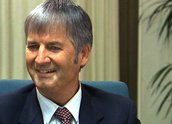


The Final Winter (2007)
Synopsis
After 13 years of first grade rugby league for the Newtown Jets, Mick 'Grub’ Henderson (Matt Nable) faces his hardest challenge – the end of his career. His vicious late hit on a St George player – his own younger brother Trent (Nathaniel Dean) – has put his team out of the finals, and landed him an appointment with the judiciary. The club president, Murray 'Colgate’ Perry (John Jarratt), wants a new era at the Jets – corporate sponsors, bigger crowds, a cleaner game. The coach, Jack Cooper (Matthew Johns), is caught between his loyalty to the players, especially Grub, and his desire to keep coaching. Grub’s wife Emma (Raelee Hill) wishes her husband would spend more time with their two young daughters. Everyone, even the barmaid at his local pub (Kate Mulvaney), tells him his day is done – that the game has to change. When his brother Trent sticks up for him, he’s cleared by the judiciary, but Colgate sacks him anyway. As he prepares for the last game of the season, Grub has to choose between the past and a future without football.
Curator’s notes
The Final Winter is about the death of rugby league, as well as the end of a footballer’s career. Mick Henderson has grown up in Sydney in the era of big men who hit each other hard behind play, had a smoke at half-time, and drank a dozen cans of beer after training. The idea that rugby league could be a clean game without needless violence seems to him to defeat the purpose. Football is violence, as well as loyalty, mateship and the possibility of glory, once a week on a Saturday afternoon. Grub’s whole self-image, including his loyalty to the memory of his brawling father, is bound up in the traditions of the game. Part of the reason he dislikes his brother is that Trent is the future of the game – a show pony who’s looking for the big bucks, with no loyalty to the club he plays for, or the memory of their father. The fact that his own club is now run by a slimy real estate agent, 'Colgate’ Perry, just makes Grub’s disgust the keener. The corporatising of rugby league will be its death knell – and in this regard, Grub’s view is that of the film’s writer and star, Matt Nable, who set the film in the 1980s because he believes the game was purer then.
'People were very different back then’, Nable told Margaret Pomeranz in a television interview in 2007. 'There was no political correctness, things were much more undiluted and simpler. For good or bad, people still look back at that era with fondness.’ Nable played first grade football for some years, with both Manly and South Sydney, and he began writing the film in 1995, while living in England, reflecting on how the game had changed. In an interview on the DVD, he says, 'Back in the 1980s … there was an authenticity about it, not just the clubs and the people around it but the players as well. They were not under scrutiny and they were not forced to deliver lines from, I guess, sterile scripts, and they were not censored. There was a rawness about the 1980s. Back then as a kid watching rugby league, it was much more of a pastime than it is now, an industry. There was something really emotionally endearing about the '80s’.
For all this nostalgia, The Final Winter is about a man realising there’s more to life than football. The biff, although absolutely celebrated in the film’s first half, is seen as essentially childish, something that 'Grub’ Henderson has to grow out of. One of the most interesting elements of Nable’s script is the way it keeps injecting a series of female voices in the story. Compare this with David Williamson’s The Club (1980) – which encompasses many of the same themes, in the context of Australian Rules – and The Final Winter plays as much less singularly masculine in its viewpoint. The women in Grub’s life also love the game; they just don’t see not playing any more as the end of life, as he does. As well as being about the end of rugby league as a working class game, The Final Winter is about the end of Grub’s extended childhood, in which he could only conceive of himself as a physical man, in the mould of his rough-hewn father.
Nable’s powerful performance makes the film. The football scenes are fairly unrealistic, except in the degree of violence, but Nable’s character speaks with a recognisable honesty that does indeed predate the era of political correctness. Nable had done no previous acting, but he has an extraordinary ease and physical grace in front of the camera. Reviewers commented on his resemblance to the young Charles Bronson and that is true, but not simply in the facial characteristics. Look at Nable’s eyes in clip two, as he’s driving the car. There’s a lot going on in his performance and, like all natural actors, it’s communicated through the eyes alone. Nable was snapped up by Hollywood soon after The Final Winter’s brief theatrical season in 2007, to play the lead in a Los Angeles-based cop show.
- Overview
- Curator’s notes
- Video 3 clips
- Principal credits
- Find a copy
- Make a comment
- Map
- Add your review



